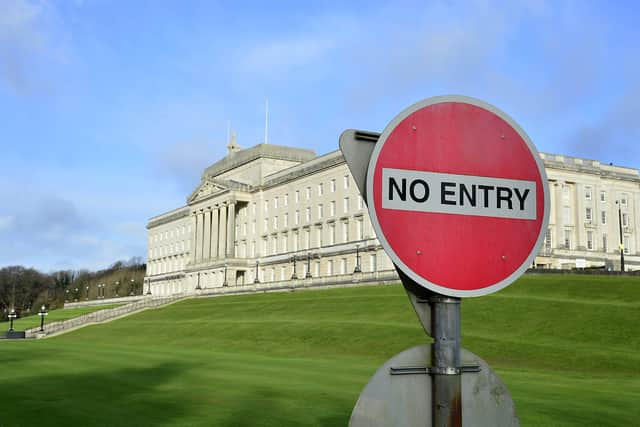Planned assembly election date of May 5 unlikely to be pulled forward despite DUP and Sinn Fein
and live on Freeview channel 276
Following the resignation of First Minister Paul Givan this week, which automatically unseats Deputy First Minister Michelle O’Neill, the assembly will be dissolved on March 28.
However new legislation passing through Westminster will mitigate the impact compared to the resignation of Deputy First Minister Martin McGuinness in 2017.
Advertisement
Hide AdAdvertisement
Hide Ad“There is some debate about the possibility of an early election—which both SF and the DUP seem to support, albeit for different reasons,” said commentator Alex Kane.


“The DUP think a quick election will keep unionists focused on protocol and not risk looking too closely at the party. And Sinn Fein want a quick election to focus on the DUP collapsing executive and maximise their own chances of becoming the biggest party.” However he noted that the actual date of the election lies solely in the gift of the Secretary of State.
By contrast it is understood that the other assembly parties, the UUP, Alliance Party and SDLP are not keen to press for an immediate election.
Under existing legislation the assembly was due to dissolve anyway for the pre-election period on March 28. The same legislation means the election was scheduled for May 5 even before Mr Givan resigned.
Advertisement
Hide AdAdvertisement
Hide AdLegislation which is due to complete its journey through Parliament next week will allow the Northern Ireland Assembly to continue for an initial six-week period since the resignation of Mr Givan, with the option that this could be extended to 24 or 48 weeks. The assembly can still meet, but it will not be able to function as normal.
As the executive can no longer meet, issues that need its approval, such as approving new policies legislation, emergency decisions or urgent procedures - cannot be passed.
The other ministers in the executive remain in post, but will be limited in what they can do.
Following the resignation of Martin McGuinness in 2017 the assembly collapsed and remained so for three years. The subsequent New Decade New Approach deal set out a range of measures which aimed to mitigate the impact of a similar resignation. The legislative basis of that deal is the legislation due to be completed next week in Parliament.
Advertisement
Hide AdAdvertisement
Hide AdThe Northern Ireland (Ministers, Elections and Petitions of Concern) Bill, will extend the period for nominating the First Minister and deputy First Minister following the resignation of either to a rolling 6-week period, which auto-renews up to a maximum 24 weeks.
The Agreement also provides up to four, 6-week periods for appointing Northern Ireland Ministers, including the First Minister and the deputy First Minister, after an election, and provides that Northern Ireland Ministers remain in office after an election for up to a maximum of 24 weeks.
A message from the Editor:
Thank you for reading this story on our website. While I have your attention, I also have an important request to make of you.
With the coronavirus lockdown having a major impact on many of our advertisers - and consequently the revenue we receive - we are more reliant than ever on you taking out a digital subscription.
Advertisement
Hide AdAdvertisement
Hide AdSubscribe to newsletter.co.uk and enjoy unlimited access to the best Northern Ireland and UK news and information online and on our app. With a digital subscription, you can read more than 5 articles, see fewer ads, enjoy faster load times, and get access to exclusive newsletters and content. Visit https://www.newsletter.co.uk/subscriptions now to sign up.
Our journalism costs money and we rely on advertising, print and digital revenues to help to support them. By supporting us, we are able to support you in providing trusted, fact-checked content for this website.
Ben Lowry
Editor